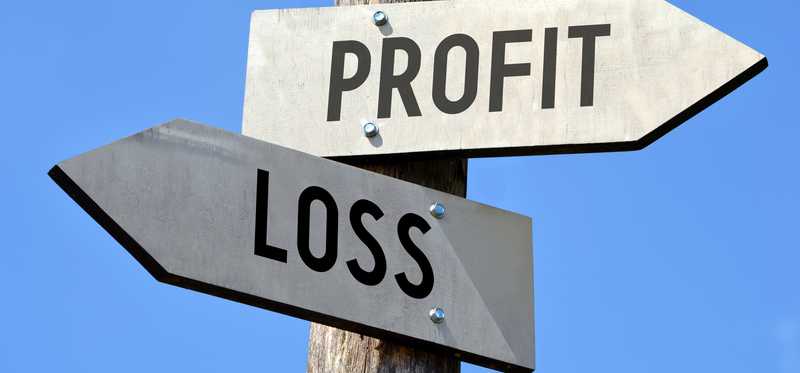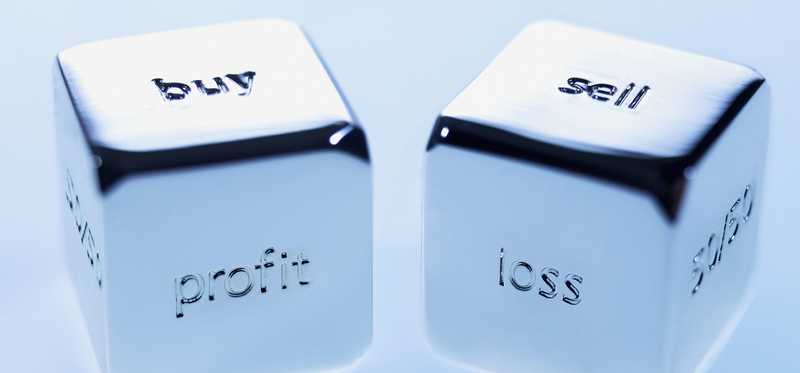15 Reasons You Absolutely Shouldn't Sell Your Stocks in the Next Market Crash

15 Reasons You Absolutely Shouldn't Sell Your Stocks in the Next Market Crash
Being a long-term investor isn't always easy, but patience pays off
There, I said it. Being a long-term investor isn't always easy. It is the single most effective way to build a market-beating portfolio that delivers and grows returns over a period of years.
Even so, riding out the ups and downs of the market can be challenging for even the most seasoned of investors.
Is it still worth it? Definitely.
Here are 15 reasons why you absolutely shouldn't sell your stocks in the next market crash.
5 Stocks Under $49
Presented by Motley Fool Stock Advisor
We hear it over and over from investors, “I wish I had bought Amazon or Netflix when they were first recommended by The Motley Fool. I’d be sitting on a gold mine!" It's true, but we think these 5 other stocks are screaming buys. And you can buy them now for less than $49 a share! Click here to learn how you can grab a copy of “5 Growth Stocks Under $49” for FREE for a limited time only.
Previous
Next

1. You could lose a lot of money
One of the most common reasons that investors dump their stocks during a market downturn is in an effort to reduce losses during these rocky periods. The irony is that in attempting to mitigate portfolio losses in a crash, hurriedly pulling out of the market can actually increase investors' losses.
In the midst of a market downturn, seeing your portfolio take a massive dip can certainly be disheartening. However, hitting the sell button on otherwise great stocks because of temporary market swings takes transitory portfolio movements and translates them into actual losses that can't be recovered.
ALSO READ: This Unstoppable Growth Stock Is Up 614% in the Last Five Years. Here's Its Secret.
Previous
Next

2. You could easily miss the great market days
No one knows how long a market crash will last. Past downturns have ranged from anywhere as short as a few weeks to a year or longer. But even during these periods, opportunities to not only invest in stocks on sale but capitalize on the strong trading days that follow abound.
By pulling your money out of the market due to temporary conditions beyond your control, you may not only cause significant damage to your portfolio but miss out on the inevitable days of recovery that tread on the heels of a downturn.
Previous
Next

3. A temporary decline in stock price doesn't nullify a great business
A cheap or expensive share price alone doesn't indicate whether or not a stock is a good buy. Rather, it indicates what the overall market values it at in a given point in time.
It's very important to differentiate stock price movements from changes to an underlying business that may or may not impact your overall investment thesis.
Put another way, if you're invested in a fantastic stock with a quality business and reliable leadership, downward pressure on its shares during a market crash doesn't suddenly make that company a poor investment.
ALSO READ: Nasdaq Bear Market: 2 Growth Stocks You'll Wish You'd Bought on the Dip
Previous
Next

4. Pulling your money in and out of the market isn't a sustainable investing strategy
If you are approaching stock investing with a long-term strategy, your intent should be to buy a diverse assortment of quality companies, hold on to them for no less than three to five years (if not much longer), and stay invested in the market over a period of decades in order to maximize your returns and retirement wealth.
A long-term investing strategy doesn't have to be complicated.
But yanking your money in and out of the market in an attempt to time the best or worst periods to invest will likely result in you missing out on both, and it simply isn't a sustainable means of accumulating (and sustaining) financial wealth over time.
Previous
Next

5. Selling all your stocks won't help you recover your portfolio losses
It's important to distinguish between temporary and actual losses in your portfolio. When you see your stocks plummet during a period of prolonged volatility or a market crash, there's no denying the pain that brings as an investor.
Unless you actually sell those stocks, though, those losses are nothing more than movements in your portfolio that could easily change from one day to the next.
5 Stocks Under $49
Presented by Motley Fool Stock Advisor
We hear it over and over from investors, “I wish I had bought Amazon or Netflix when they were first recommended by The Motley Fool. I’d be sitting on a gold mine!" It's true, but we think these 5 other stocks are screaming buys. And you can buy them now for less than $49 a share! Click here to learn how you can grab a copy of “5 Growth Stocks Under $49” for FREE for a limited time only.
Previous
Next

6. Every market crash is different
While history is certainly a helpful guide when evaluating the conditions and series of events that may lead to or impact a market downturn, no crash is exactly the same. Therefore, trying to predict the right moment to invest or cash out your portfolio in a downturn based on events that have happened in the past and may not repeat is neither a wise nor effective strategy.
Rather than looking at market crashes as a thing to fear, consider them an opportunity to identify compelling investments that will stand the test of time in your portfolio (and often, to snag them at a bargain).
ALSO READ: 2 Stocks You'll Be Happy You Own When the Bear Market Is Over
Previous
Next

7. The market won't stay down forever, and no one can predict when the rebound will happen
While the characteristics of past market downturns have their similarities and differences, there is one important factor that every single downturn has in common. No matter how long a market crash has lasted, it has always come to an end.
No investors -- be they market gurus or Wall Street mainstays -- can say with exact certainty how long any market downturn will last before the rebound happens. However, investors who remained in the market during the dark days will be ready and waiting when the rebound does occur.
Previous
Next

8. You don’t have to touch your stocks at all
A market crash is usually a great time to add to your winning stocks, especially while they're trading at a bargain. With that being said, you don't actually have to do anything, not a single thing, during a market crash.
If you're not comfortable investing during these periods, you simply don't trust your emotions to help you make the most effective investing decisions, or you want to hold onto some extra cash for peace of mind, you can leave your stocks alone.
Keeping your hands off your stocks during a market crash isn't a cop-out. In fact, it may be one of the wisest decisions an investor can make during a market downturn.
ALSO READ: Nasdaq Bear Market: 3 High-Yield Dividend Stocks That Can Double Your Money by 2026
Previous
Next

9. Selling all your stocks won't safeguard your portfolio
Another common reason that investors rush to sell off their stocks during a downturn is in an attempt to protect their portfolio over the long term. Unfortunately, this approach rarely has the desired outcome.
For one, you're likely to sell your stocks at far less than you originally paid for them -- and lose money in the process that you won't easily get back. Plus, you may end up selling shares of an otherwise great business that would have produced solid returns for your portfolio over many years, simply because the stock was hit hard in a relatively short span of time.
When you're investing in companies for anywhere from several years to decades, even months or more of prolonged volatility in the market are a fleeting event compared with your broader investing outlook.
Previous
Next

10. Making portfolio decisions based on fear or panic can turn into a dangerous habit
Once you start making decisions about your stocks based on volatile emotions like fear or panic, this can turn into a reflex that has a lasting and detrimental impact on your portfolio over the long term. You could also relinquish significant returns and profit over the years by trying to invest in this way.
In contrast, when you only put your money into businesses that you know inside and out -- and that you have a strong conviction about as long-term investments -- this will enable you to maintain your fortitude and peace of mind during a market crash and better drown out short-term noise.
5 Stocks Under $49
Presented by Motley Fool Stock Advisor
We hear it over and over from investors, “I wish I had bought Amazon or Netflix when they were first recommended by The Motley Fool. I’d be sitting on a gold mine!" It's true, but we think these 5 other stocks are screaming buys. And you can buy them now for less than $49 a share! Click here to learn how you can grab a copy of “5 Growth Stocks Under $49” for FREE for a limited time only.
Previous
Next

11. Long-term investors reap the benefits of compounded portfolio returns by staying in the market
Famed investor and philanthropist Jack Bogle once said, "The idea that a bell rings to signal when to get into or out of the stock market is simply not credible. After nearly fifty years in this business, I don't know anybody who has done it successfully and consistently. I don't even know anybody who knows anybody who has."
In other words, if anyone could forecast the high or low tides of the market, they would have surpassed the wisdom and knowledge of any investor who has ever lived. No matter what anyone tells you, there's simply no way to predict the whims of the market with both consistency and accuracy. And the truth is, you don't need to.
When you stay invested in the market, certainly you will experience rough waters and downturns in your investing journey. There's no avoiding that. At the same time, you will also be ready to profit from the market's best periods of growth when they do happen.
ALSO READ: 2 Industrial Stocks to Buy Before the Bear Market Is Over
Previous
Next

12. Pulling all your money out of stocks will only set you back
Whatever your long-term financial goals, panic selling (or panic buying) stocks won't help you get there. Rather than cashing out your portfolio during choppy market windows, you should make a habit of taking a look at the balance of your portfolio.
Even if you follow the approach of dollar-cost averaging, your investments will grow and pull back at different rates. Balancing and rebalancing your portfolio over time can help you ensure that you're staying invested in a way that fits your current aptitude for risk, and it can make you less inclined to make rash investing decisions amid market mayhem.
Previous
Next

13. You could waste valuable time waiting to get back into the market
Let's say you did take the plunge and sold off most or all of your stocks during the next bear market. What then? You certainly won't meet your portfolio goals by staying out of the market long term.
And the longer you stay out of the market, the harder it may be to get back in. The hurdle of analysis paralysis can arise in many walks of life, and investing is no exception.
While cashing out your stocks may prevent additional short-term losses, you could also be left sitting on the bench when the market inevitably rebounds. It's far better to leave your portfolio completely alone during a market crash than to sell off your stocks and start from scratch all over again.
ALSO READ: This Is Suze Orman's Best Advice for Investing in a Bear Market
Previous
Next

14. There's no way to know exactly when a crash will occur
Bear market predictions come and go, but they're not always accurate. All the signals that a bear market is around the corner may appear, without the actual occurrence of one. Likewise, bear markets can take investors totally by surprise, as recent history has shown.
You shouldn't be putting your money into investments with the intent of generating tremendous returns in a short period. While certain investments may have this outcome, they're few and far between.
Rather, in the words of Warren Buffett, you should approach investments so that you "Only buy something that you'd be perfectly happy to hold if the market shut down for 10 years."
Previous
Next

15. A market crash doesn't mean all your investments are suddenly bad
I'm not saying you should never sell a stock, particularly if you don't have faith in the business or management any longer. Whenever you do want to pull the trigger and sell a stock, consider your reasons for doing so.
If it goes back to the fact that shares are trading down in a broadly volatile market without any key changes to the business itself, think long and hard before you do so.
5 Stocks Under $49
Presented by Motley Fool Stock Advisor
We hear it over and over from investors, “I wish I had bought Amazon or Netflix when they were first recommended by The Motley Fool. I’d be sitting on a gold mine!" It's true, but we think these 5 other stocks are screaming buys. And you can buy them now for less than $49 a share! Click here to learn how you can grab a copy of “5 Growth Stocks Under $49” for FREE for a limited time only.
Previous
Next

Finding balance as an investor in 2022 and beyond
Finding success as a long-term investor doesn't require you to try to time the market or attempt to miss its worst days. Few could do so on a regular basis if they tried.
Rather, a successful long-term investor is one who has the strategy to identify compelling businesses, the mindset to invest in them regardless of the market environment, and the willpower to stay invested in great companies even when others around them are panicking and selling due to transitory market conditions.
The Motley Fool has a disclosure policy.
Previous
Next
Invest Smarter with The Motley Fool
Join Over Half a Million Premium Members Receiving…
- New Stock Picks Each Month
- Detailed Analysis of Companies
- Model Portfolios
- Live Streaming During Market Hours
- And Much More
READ MORE
HOW THE MOTLEY FOOL CAN HELP YOU
-
Premium Investing Guidance
Market beating stocks from our award-winning service
-
The Daily Upside Newsletter
Investment news and high-quality insights delivered straight to your inbox
-
Get Started Investing
You can do it. Successful investing in just a few steps
-
Win at Retirement
Secrets and strategies for the post-work life you want.
-
Find a Broker
Find the right brokerage account for you.
-
Listen to our Podcasts
Hear our experts take on stocks, the market, and how to invest.
Premium Investing Services
Invest better with The Motley Fool. Get stock recommendations, portfolio guidance, and more from The Motley Fool's premium services.